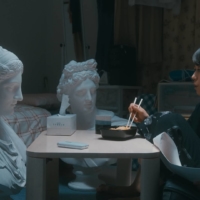Yosuke Okuda knows how to make an impression. In the opening sequence of “Graveyard of Youth,” the director’s onscreen persona is dragged out of a restaurant and hauled in front of a gangster type who threatens to give him a good hiding. Okuda’s character responds by nonchalantly picking up the man’s discarded cigarette and stubbing it out on his own tongue — revealing in the process that he’s missing his front teeth — then headbutting the sucker.
It’s quite the curtain raiser, but what follows isn’t simply a repeat of the pugilistic, darkly comic style that Okuda honed over his first three features, most notoriously with “The Dork, the Girl and the Douchebag” (2015). This is both his warmest and most rewarding film to date, with the caveat that it hinges around an event of senseless violence that’s likely to unsettle even the most jaded viewer.
The scene in question stayed with me for months after I first saw the movie at Tokyo Filmex in 2021. It took a second viewing to convince me that Okuda wasn’t some cynical shock jock trying to get a rise out of his audience. The world he depicts in “Graveyard of Youth” can be brutally cruel, but it isn’t a relentless downer: There’s plenty of humor, even sweetness, as well as a genuine sympathy for the flaws that make us human.
The film divides neatly into two parts, using a nonlinear structure reminiscent of “Pulp Fiction” (1994). Okuda plays a central role in the first part, as a burly, shaven-headed cook who gets asked to help a coworker’s teenage son (Takashi Kasahara) deal with some older bullies. This he does reluctantly, though it would be an understatement to say that things don’t go as anticipated.
None of the characters are named, which is in keeping with the leanness of Okuda’s storytelling. He ventures to some dark places: There’s an offscreen rape, and a revenge beating that leaves a character half-dead and not quite buried. But even the seeming villains of the tale are humanized — not so much to excuse their behavior as to underscore how ordinary people can be capable of monstrous acts.
The most monstrous of these also marks the point at which the film pivots to a second story that feels positively benign in comparison to what came before. A 30-something stage actress (Nanae Furukawa) who’s just been dumped throws herself into a rebound relationship with a struggling manga artist (Atsuyuki Tanaka). Both are still pursuing the dreams of their youth, but wondering if it’s time to settle for a more comfortable mediocrity.
It’s a romantic comedy without the romance, yet somehow manages to find its way to a happy ending – until you realize where that denouement lands in the film’s chronology. Imagine Gaspar Noe’s “Irreversible” (2002) spliced with a Judd Apatow movie and you’re halfway to appreciating the unique discomfort that Okuda manages to induce here.
The film’s settings are convincingly drawn, while the director and his small crew have managed to squeeze a lot out of a reported ¥6 million budget. The nod to Kinji Fukasaku’s caustic gangster drama “Graveyard of Honor” (1975) in the film’s title reflects a shared sensibility – an appreciation for the harder things in life. This is a bruising experience, but an invigorating one.
| Rating | |
|---|---|
| Run Time | 96 mins. |
| Language | Japanese |
| Opens | Now showing |

















With your current subscription plan you can comment on stories. However, before writing your first comment, please create a display name in the Profile section of your subscriber account page.